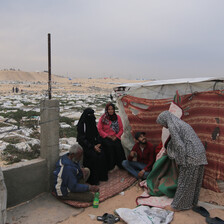The Electronic Intifada 16 November 2023

Staff at al-Aqsa Martyrs hospital in central Gaza are treating a massive number of injured people.
APA imagesEbraheem Matar is a doctor working in the intensive care unit of al-Aqsa Martyrs hospital, central Gaza.
“Since the first day of the war, I have been living in the hospital as a doctor and a displaced Gazan,” he said.
Matar has not seen his family for the duration of the war. He had to leave them so that he could work in Deir al-Balah, the city where the hospital is located.
“It is catastrophic here,” he said. “The wounded are everywhere – corridors, stairs, floors and yards. The mass killing would overwhelm even the most well-equipped hospitals anywhere in the world. Gaza, which has always teetered on the brink of collapse even before the war, is sadly no exception to this reality.”
“We don’t have enough beds, equipment or staff to help everyone properly,” he added. “People are coming in with really serious injuries – burns, head injuries and multiple broken bones.”
The ICU at al-Aqsa Martyrs hospital has only 18 beds. That is inadequate given the huge numbers of people who have been wounded in Israeli airstrikes.
“Wounds are usually severe and inflected to the extent that worms can be seen in the wounds,” Matar said. “Patients who have been rescued from under the rubble usually have extensive burns filled with chemicals and dust.”
In one case, a 20-year-old woman had severe burns all down her right leg. Her wound was severely infected and full of dust and rubble.
Doctors used vinegar and chlorine bleach to sterilize the wound. They also gave the woman multiple antibiotics.
The efforts to save her proved unsuccessful and the woman died in the hospital.
“Patients came to the hospital and we have nothing to provide,” Matar said. “Analgesia is only available in the operating rooms. Otherwise, patients have to tolerate the pain no matter how severe it is. Unfortunately, even in the operating rooms, they will run out [of analgesia] soon.”
“Illogical and impossible”
Israel has killed many of Matar’s friends and colleagues in the hospital.
“Doaa Awad was a hardworking, caring and nice doctor,” he said. “She received the dead bodies of her uncle’s family before she went home to check on her family. The next day we received her as a martyr.”
Moaz al-Nabheen, a volunteer doctor, was torn to pieces in an attack. He had been learning German as he planned to undertake specialist training in Germany.
Inas Yousef, a pregnant mom of a 3-year-old son was killed along with her son. Her husband – a doctor – has sustained a severe spinal injury and is now unable to walk.
“Families full of dreams were killed in less than a second,” Matar said. “These doctors have left an irreplaceable gap in our hearts as fellow humans, friends, and colleagues in the medical field. Their absence adds to the growing scarcity of vital medical staff, intensifying the weight of loss in these circumstances.”
Israel has been attacking hospitals in Gaza City directly and has ordered the evacuation of patients in some hospitals. Mattar heaps scorn on such orders.
“Evacuate to where?” he said. “This is nonsense, illogical and impossible.”
At least 223 healthcare workers have been killed in Gaza since 7 October. Among them were 72 nurses, 37 physicians, 26 pharmacists, 21 paramedics and 14 laboratory technicians.
Doctors are emotionally scarred by what they have seen and continue to see, particularly by receiving their own families’ and friends’ dead bodies. Many doctors have seen patients die.
“A patient was fleeing to the south and witnessed bombardment nearby,” Matar said. “His heart stopped. We tried to resuscitate him but unfortunately we lost him.”
The situation has gotten so bad in Gaza that people are saying they would prefer to be killed swiftly than be injured and in pain without proper treatment.
Like everyone else in Gaza, doctors are struggling to keep going with very little food and water.
Matar misses life before this war, family dinners, mornings at the seaside, the opportunity to hang out with friends and hear music, watching Real Madrid in action.
He has a simple and clear appeal: an immediate ceasefire coupled with substantial medical aid, not just water bottles and COVID-19 kits.
Matar is tired of empty gestures. He urges everyone to pressure their leaders and insist that Israel ends its violence against Gaza.
Sewar Elejla was formerly a doctor at al-Shifa hospital in Gaza. She is now a Canada-based researcher.





